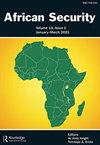How Do Individuals Join the Al-Shabaab? An Ethnographic Insight into Recruitment Models for the Al-Shabaab Network in Kenya
IF 1.3
Q2 POLITICAL SCIENCE
引用次数: 3
Abstract
ABSTRACT Al-Shabaab employs diverse strategies to recruit and radicalize youth to the network. The Social Movement Theory is used to assess recruitment models for terrorist networks such as the Al-Shabaab. Five models are explored to understand the evolving recruitment trends for the Al-Shabaab network from 2007 to 2019: the net, funnel, infiltrator, intimidation, and for-profit motives. Drawing on ethnographic fieldwork of selected 47 cases of individuals associated with the Al-Shabaab, the study recognizes the role of kinship networks, social relationships between the recruiter and the recruited, group dynamics, and recruitment spaces as crucial in Al-Shabaab recruitment. The study offers insights into the evolving recruitment strategies of terrorist organizations navigating counter-terrorism responses in the aftermath of terror attacks at the Westgate Mall and the Garissa University attacks in Kenya.个人如何加入青年党?肯尼亚青年党网络招募模式的民族志洞察
青年党采用多种策略招募青年并使其激进化。社会运动理论被用来评估像青年党这样的恐怖主义网络的招募模式。本文探讨了五种模型,以了解青年党网络从2007年到2019年的发展趋势:网络、漏斗、渗透、恐吓和营利动机。根据选定的47个与青年党有关的个人的人种学实地调查,该研究认识到亲属网络、招募者和被招募者之间的社会关系、群体动态和招募空间在青年党招募中起着至关重要的作用。该研究为恐怖组织在西门购物中心恐怖袭击和肯尼亚加里萨大学恐怖袭击后的反恐反应中不断演变的招募策略提供了见解。
本文章由计算机程序翻译,如有差异,请以英文原文为准。
求助全文
约1分钟内获得全文
求助全文

 求助内容:
求助内容: 应助结果提醒方式:
应助结果提醒方式:


